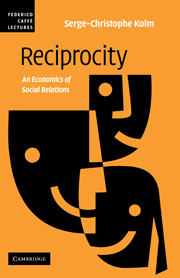Book contents
- Frontmatter
- Contents
- List of illustrations
- Foreword
- Introduction
- Part I Facts and forms
- Part II Motives
- 5 The three worlds of reciprocity
- 6 Balance reciprocity
- 7 Liking reciprocities
- 8 Other reciprocities: continuation, relational, imitation, extended
- 9 Reciprocity and social sentiments
- 10 Reciprocity in the modes of economic realization
- Part III Values and reasons
- Part IV The economics of reciprocity
- Bibliography
- Index
8 - Other reciprocities: continuation, relational, imitation, extended
Published online by Cambridge University Press: 22 September 2009
- Frontmatter
- Contents
- List of illustrations
- Foreword
- Introduction
- Part I Facts and forms
- Part II Motives
- 5 The three worlds of reciprocity
- 6 Balance reciprocity
- 7 Liking reciprocities
- 8 Other reciprocities: continuation, relational, imitation, extended
- 9 Reciprocity and social sentiments
- 10 Reciprocity in the modes of economic realization
- Part III Values and reasons
- Part IV The economics of reciprocity
- Bibliography
- Index
Summary
Presentation
The last two chapters have analysed the two basic types of genuine reciprocity, balance (matching, comparative) reciprocity and liking reciprocity. Their theories will be presented in chapters 18 and 19, respectively. The present chapter completes the general presentation of reciprocity by considering the other phenomena involved and can propose a more general synthesis. The presentation of continuation reciprocity completes that of the trio of types of reciprocity in a broad sense, but is only brief here because this process relates closely to sequential exchange discussed in chapter 3 (and applied in following chapters). The central and comparative triangular structure of the phenomenon of reciprocity can then be understood better. Other important phenomena are then considered: the appreciation, in reciprocities, of the relation or of the process in themselves, and the cases of status and symbolic reciprocities; the roles of imitation of acts and conforming; and the particular ways in which the reciprocitarian motives induce the various types of extended reciprocities.
Continuation reciprocity
Reacting in reciprocity to an act, an attitude or an expressed judgment in order to induce its repetition is common but requires a number of conditions. This act, attitude or judgment has to be desired by the reciprocator, and the reciprocation has to be desired by the initial actor. The repetition should be a possibility. Moreover, the initial actor should believe that this new act, attitude or judgment of hers will again be rewarded, for instance again by a reciprocation.
- Type
- Chapter
- Information
- ReciprocityAn Economics of Social Relations, pp. 134 - 141Publisher: Cambridge University PressPrint publication year: 2008



